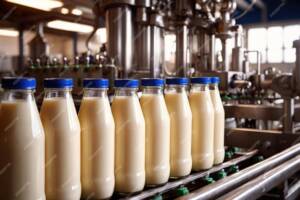
With the growing health awareness and demand for plant-based food products, almond milk has become one of the most popular plant-based alternatives to animal milk. Establishing an almond milk production plant is a promising investment opportunity in the booming plant-based food market. However, like any large project, this investment requires careful planning and a comprehensive understanding of the production process and its associated challenges.
If you are looking for an investment opportunity that combines profitability and sustainability, starting an almond milk factory may be the perfect choice. In this article, we will explore how this project can be the key to your success in the booming plant-based food market, and what are the essential steps to achieve this successfully. Get ready to enter the world of production that combines innovation with high health value.
Table of content:
1-The importance of almond milk in the market
2-Steps to starting an almond milk factory
3-The role of technology in improving almond milk production
3-Bronano is your strategic partner in supporting the establishment of an almond milk factory
The importance of almond milk in today’s market
The increasing demand for plant-based products
In recent years, global markets have witnessed a significant increase in demand for plant-based food products. This trend is attributed to the increasing environmental and health awareness among consumers, who are looking for alternatives to animal milk. Almond milk is a preferred choice due to its delicious taste and high nutritional value, making it a healthy alternative to traditional milk.
Health Benefits of Almond Milk
Almond milk is not only an alternative to milk, but it is also a healthy drink par excellence. It is low in calories and fat, and is rich in vitamins such as vitamin E, which acts as an antioxidant. It is also fortified with calcium and vitamin D, making it an excellent choice for supporting bone health. These benefits make almond milk a favorite drink for different age groups, from children to the elderly.
Investment Opportunities in starting an Almond Milk Factory
With the growing popularity of almond milk, investing in establishing an almond milk factory is an excellent strategic move. Investors entering this market can benefit from the growing demand and achieve lucrative profits. However, success in this field requires more than just financial investment; it requires a deep understanding of the market, careful planning, and technical support from industry experts.
Steps to starting an almond milk factory
1. Market study and identify opportunities
Before starting to establish an almond milk factory, it is essential to conduct a comprehensive market study. This study includes analyzing the local and global demand for almond milk, identifying the main competitors, and understanding consumer trends. This step helps investors make informed decisions about the size of the factory, the target location, and the products to focus on.
2. Choosing the right location for the factory
The ideal location for the factory plays a crucial role in the success of the project. The factory should be close to sources of raw materials (such as almond farms) to reduce transportation costs. In addition, the site should be well connected to transportation networks to facilitate the distribution of the final products to local and international markets.
3. Design and development of the production line
Developing an efficient production line requires choosing the right equipment and intelligent design of processes. The production line includes stages such as cleaning almonds, soaking, grinding, filtering, sterilization, and packaging. Choosing the right equipment ensures the efficiency of the processes and the quality of the final product. Here, specialized consultations play a vital role in designing the production line to suit the needs of the factory.
4. Implementing Quality and Safety Standards
Maintaining quality and food safety standards is of utmost importance in almond milk production. The factory must follow quality management systems such as ISO and HACCP to ensure that the product meets health and food standards. This enhances consumer confidence and ensures product safety.
5. Almond Milk Packaging
Packaging is not just the final step in the production process; it is a vital part of the marketing strategy. The packaging must be designed to appeal to consumers and protect the product from damage. The choice of packaging materials and branding design reflects the quality of the product and its distinction in the market.
The Role of Technology in Improving Almond Milk Production
Technology plays a major role in improving the efficiency of almond milk production. By using advanced technologies in grinding, extraction and sterilization, milk quality can be improved and costs reduced. In addition, technology contributes to improving the quality control process, ensuring a homogeneous and defect-free product.
ProNano is your strategic partner in supporting the establishment of an almond milk factory
Design of processes and production lines
ProNano is distinguished by its expertise in designing processes and production lines that ensure high efficiency in establishing an almond milk factory. The company provides consultations on equipment selection and planning workflows within the factory to ensure maximum productivity and quality. This design is based on a deep understanding of almond milk production processes and the latest technologies used in the industry.
Training of personnel and knowledge transfer
The success of any factory depends largely on the skills of its workers. ProNano offers specialized training programs for technical and administrative personnel within the factory. These programs include training on operating and maintaining equipment, in addition to applying quality standards. This training ensures that the team has the necessary knowledge to maximize the benefit of the production line and maintain product quality.
Quality Management and Compliance
ProNano helps develop and implement quality management systems that ensure the factory’s compliance with international and local standards. The company provides consultations on how to effectively implement systems such as ISO and HACCP within the factory. These systems ensure that the almond milk produced in the factory meets the highest quality and safety standards.
Producing almond milk in the factory requires careful planning and providing the appropriate technology to ensure the production of a high-quality product that meets consumers’ expectations. Almond milk is characterized by its multiple health benefits and its importance as a healthy alternative to animal milk. With the increasing demand for almond milk, establishing a factory to produce it can be a promising investment opportunity. ProNano Food Industry Consulting Company provides comprehensive support to investors by providing specialized consultations that cover all aspects of establishing and operating an almond milk factory, ensuring the success of the project and achieving the desired goals.
For more details and to request a consultation, contact us


